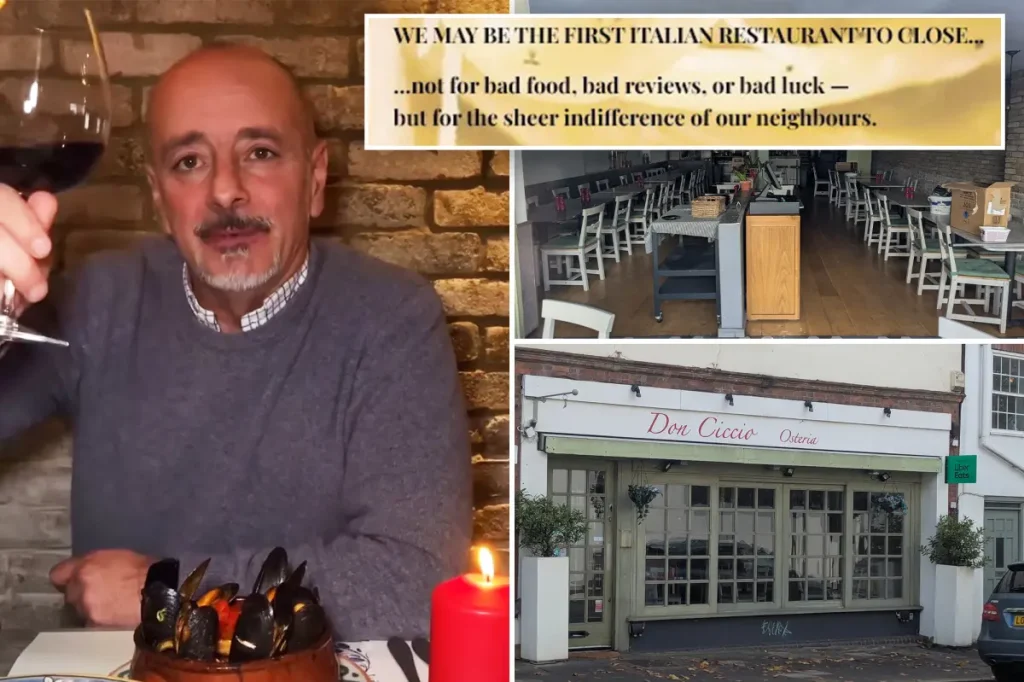Italian Restaurant’s Bitter Farewell to an Indifferent Community
In a poignant display of frustration and disappointment, Don Ciccio, an Italian restaurant in Highgate, north London, recently closed its doors after six years of operation with a stinging farewell message to the local community. Rather than a typical closing announcement expressing gratitude to loyal patrons, the restaurant’s parting words were a scathing critique of what they perceived as community indifference. “We have closed due to a lack of customers,” the statement began bluntly on their website. “To the community of Highgate and its neighbors—thank you for never supporting us, not even once.” This unconventional goodbye letter has sparked conversations about the challenges small businesses face and the complex relationship between local establishments and the communities they attempt to serve. The restaurant’s message highlights a sense of betrayal, particularly noting those who ordered delivery from other places despite living nearby and those who frequented the establishment during lockdown but disappeared once restrictions lifted.
The bitterness in Don Ciccio’s farewell message reflects a deeper frustration with what they saw as a disconnect between recognition and actual patronage. Despite boasting impressive credentials—maintaining a 4.7-star Google rating with 700 reviews throughout their six-year run, being named Traveler’s Choice on TripAdvisor for three consecutive years, and receiving acclaim for having “one of the best pizzas in London”—these accolades weren’t enough to sustain the business. “We may be the first Italian restaurant to close not for bad food, bad reviews, or bad luck—but for the sheer indifference of our neighbors,” the message stated with palpable disappointment. The restaurant had clearly invested in quality, with their menu featuring classic Italian dishes ranging from $19 to $35, and made efforts to keep their offerings fresh by “changing our menu each season, roaming through the flavors of Italy.” Yet despite this commitment to culinary excellence, they couldn’t convert recognition into the consistent customer base needed for survival.
Particularly pointed was the restaurant’s critique of specific community entities and behaviors. They called out the Highgate Society for “never replying to any of our proposals for collaboration,” suggesting failed attempts at community integration. They thanked those who “lived a few doors away yet ordered delivery from somewhere else” for their “commitment to distance,” employing biting sarcasm to express their hurt at being overlooked by their closest potential customers. The restaurant also specifically mentioned the abandonment they felt from customers who frequented them during the pandemic’s darkest days: “To those we served during lockdown, when we were the only restaurant open, thank you for never visiting us once the pandemic ended.” This reference to pandemic-era loyalty that evaporated speaks to a broader phenomenon many restaurants experienced—temporary support during extraordinary circumstances that didn’t translate to sustained patronage during normal times.
While the restaurant’s TripAdvisor rating of 4.6 out of 5 from 239 reviews suggests an overall positive customer experience, the owners noted that recent reviews had been less favorable, with one explicitly advising potential customers, “Do not go there.” This detail adds complexity to the narrative—was the closure truly due to community indifference alone, or had quality perhaps declined toward the end? The restaurant’s owners, however, firmly positioned themselves as victims of neighborhood apathy rather than any shortcomings of their own. Their closing statement, “We are guests in this country, and as guests, we will not complain. We’ll simply say: addio,” suggests both a cultural deference and a subtle jab—they are indeed complaining, quite publicly and pointedly, while claiming they won’t. This tension between their scathing critique and their claim of gracious acceptance creates a compelling contradiction in their farewell message.
The restaurant’s dramatic exit prompted a response from Andrew Sulston, chair of the Highgate Society, who expressed regret at the closure but offered a measured defense: “We are always very sorry when any local business closes. Because Highgate Society has no paid staff and all our activities are run by volunteers, we unfortunately cannot always follow up on all requests.” This response highlights the disconnect between small businesses’ expectations of community organizations and the realities of those organizations’ capacities—a microcosm of the larger tensions between businesses and the communities they serve. The exchange raises important questions about mutual responsibility: Do local residents have an obligation to support nearby businesses? Do community organizations have a duty to collaborate with local establishments? And do businesses deserve patronage simply by virtue of their location, or must they earn it through other means?
Don Ciccio’s bitter farewell serves as a cautionary tale about the fragility of small businesses and the emotional toll of entrepreneurship. Behind the statistics of restaurant closures are real people who invested time, money, and passion into ventures that ultimately didn’t succeed. The owners’ frustration—expressed through their sardonic “thank you for supporting us so perfectly”—reveals the personal disappointment that accompanies business failure. Whether their assessment of community indifference was fair or not, their experience reflects the challenges facing small independent restaurants in competitive urban markets, where positive reviews and quality offerings don’t automatically translate to sustainable business. As Don Ciccio’s story circulates, it may prompt soul-searching among community members about supporting local businesses, while also raising questions for entrepreneurs about realistic expectations of community loyalty in today’s diverse dining marketplace. The restaurant’s final “addio” resonates as both a goodbye and a warning—a reminder of what can be lost when local establishments are taken for granted.














